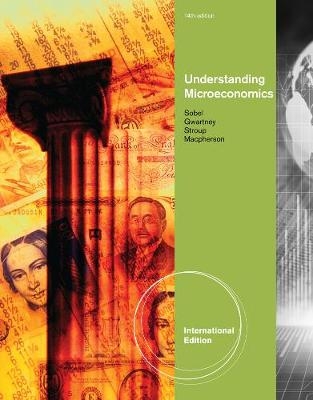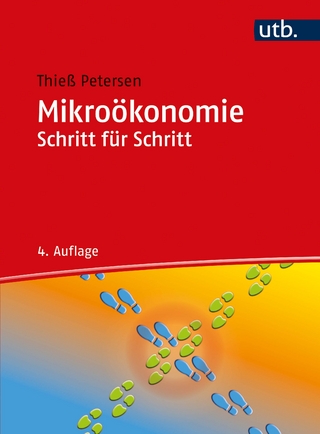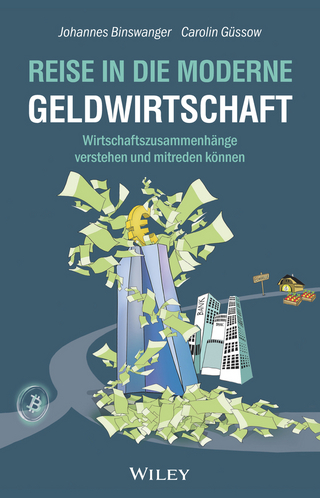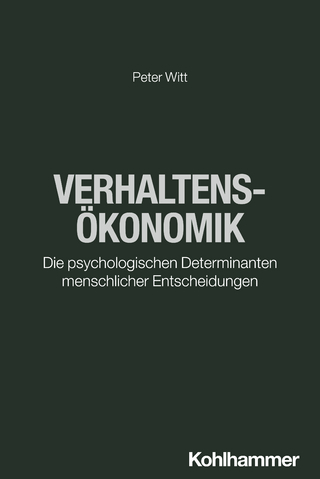
Understanding Microeconomics, International Edition
South-Western College Publishing (Verlag)
978-1-111-97058-1 (ISBN)
- Titel z.Zt. nicht lieferbar
- Versandkostenfrei innerhalb Deutschlands
- Auch auf Rechnung
- Verfügbarkeit in der Filiale vor Ort prüfen
- Artikel merken
UNDERSTANDING MICROECONOMICS, 14E, International Edition reflects current economic conditions, enabling you to apply economic concepts to the real world. The up-to-date text includes analysis and explanation of measures of economic activity in today’s market. It also includes highlights of the recession of 2008-2009, and an in-depth look at the lives and contributions of notable economists. UNDERSTANDING MICROECONOMICS, 14E, International Edition dispels common economic myths. The text uses the "invisible hand" metaphor to explain economic theory, demonstrating how it works to stimulate the economy.
The 14th edition includes a robust set of online multimedia learning tools with video clips and free quizzes designed to support classroom work. A completely updated Aplia interactive learning system is also available--with practice problems, interactive tutorials, online experiences and more.
James D. Gwartney holds the Gus A. Stavros Eminent Scholar Chair at Florida State University, where he directs the Stavros Center for the Advancement of Free Enterprise and Economic Education. His writings have been widely published in both professional journals and popular media. He is a co-author of COMMON SENSE ECONOMICS: WHAT EVERYONE SHOULD KNOW ABOUT WEALTH AND PROSPERITY (St. Martin’s Press, 2016), a primer on economics and personal finance. Dr. Gwartney’s current research focuses on the measurement and determination of factors that influence cross-country differences in income levels and growth rates. In this regard he is the co-author (with Robert Lawson and Joshua Hall) of the annual report, Economic Freedom of the World, which provides information on the institutions and policies of 157 countries. This data set, published by a worldwide network of institutes in 80 countries, is widely used by scholars investigating topics ranging from economic growth to peaceful relations among nations. Dr. Gwartney served as Chief Economist of the Joint Economic Committee of the U.S. Congress during 1999-2000. In 2004, he was the recipient of the Adam Smith Award of the Association of Private Enterprise Education for his contribution to the advancement of free market ideals. He is a past President of the Southern Economic Association and the Association for Private Enterprise Education. He earned his Ph.D. in economics from the University of Washington. Richard L. Stroup is Professor Emeritus of economics at Montana State University and Professor Emeritus of economics at North Carolina State University. His Ph.D. is from the University of Washington. From 1982 to 1984 he served as director of the Office of Policy Analysis at the U.S. Department of the Interior. Stroup has published and lectured on topics such as global warming, land use regulation, archaeology, and about needed environmental policy improvements. His research helped to develop the approach known as free market environmentalism. He is a co-author of COMMON SENSE ECONOMICS: WHAT EVERYONE SHOULD KNOW ABOUT WEALTH AND PROSPERITY (St. Martin’s Press, 2016). His book ECONOMICS: WHAT EVERYONE SHOULD KNOW ABOUT ECONOMICS AND THE ENVIRONMENT (Washington: Cato Institute, 2003) was sponsored by the Property and Environment Research Center, of which he is a co-founder. Russell S. Sobel earned his Ph.D. in economics from Florida State University in 1994. He has published more than 200 books and articles, and has received national recognition for his works on entrepreneurship and FEMA reform. Dr. Sobel serves on the editorial board for three academic journals, and on the advisory board for four university centers. He has won numerous awards for both his teaching and his research. He regularly teaches courses in both principles of economics and public economics and gives lectures at economic education outreach programs. Dr. Sobel is a Professor of Economics and Entrepreneurship at The Citadel. David A. Macpherson is the E.M. Stevens Distinguished Professor of Economics and Economics Department Chair at Trinity University. Previously, he was Director of the Pepper Institute on Aging and Public Policy and the Rod and Hope Brim Eminent Scholar of Economics at Florida State University, where he received two university-wide awards for teaching excellence. His teaching areas include principles of microeconomics, money and banking, econometrics, and labor economics. Dr. Macpherson is an applied economist whose research focuses on real estate, pensions, discrimination, industry deregulation, labor unions, and the minimum wage. He has published more than 60 articles in leading economics and real estate journals, including Review of Economic and Statistics, Journal of Labor Economics, Journal of Human Resources, Industrial and Labor Relations Review, Journal of Real Estate Economics and Finance. His research has been funded by a variety of entities including the National Science Foundation, Florida Legislature, and the National Association of Realtors. He is co-author of the undergraduate labor economics text, CONTEMPORARY LABOR ECONOMICS, 11E as well as the annual UNION MEMBERSHIP AND EARNINGS DATA BOOK: COMPLIATIONS FROM THE CURRENT POPULATION SURVEY. He is included in WHO’S WHO IN ECONOMICS, 4E which includes the 1,200 most frequently cited economists. Dr. Macpherson received his undergraduate degree and Ph.D. from Pennsylvania State University.
Part I: THE ECONOMIC WAY OF THINKING.
1. The Economic Approach.
2. Some Tools of the Economist.
Part II: MARKETS AND GOVERNMENT.
3. Supply, Demand, and the Market Process.
4. Supply and Demand: Applications and Extensions.
5. Difficult Cases for the Market, and the Role of Government.
6. The Economics of Collective Decision Making.
Part III: CORE MICROECONOMICS.
7. Consumer Choice and Elasticity.
8. Costs and the Supply of Goods.
9. Price Takers and the Competitive Process.
10. Price-Searcher Markets with Low Entry Barriers.
11. Price-Searcher Markets with High Entry Barriers.
12. The Supply of and Demand for Productive Resources.
13. Earnings, Productivity, and the Job Market.
14. Investment, the Capital Market, and the Wealth of Nations.
15. Income Inequality and Poverty.
Part IV: INTERNATIONAL ECONOMICS.
16. Gaining from International Trade.
Part V: APPLYING THE BASICS: SPECIAL TOPICS IN ECONOMICS. (subject to change)
Special Topic 1 Government Spending and Taxation.
Special Topic 2 The Internet: How Is It Changing the Economy?
Special Topic 3 The Economics of Social Security.
Special Topic 4 The Stock Market: Its Function, Performance, and Potential as an Investment Opportunity.
Special Topic 5 The Crisis of 2008: Causes and Lessons for the Future.
Special Topic 6 Lessons from the Great Depression.
Special Topic 7 The Economics of Health Care.
Special Topic 8 School Choice: Can It Improve the Quality of Education in America?
Special Topic 9 Earnings Differences between Men and Women.
Special Topic 10 Do Labor Unions Increase the Wages of Workers?
Special Topic 11 Are We Running Out of Resources?
Special Topic 12 Difficult Environmental Cases and the Role of Government.
Appendix A General Business and Economics Indicators for the United States.
Appendix B Answers to Selected Critical Analysis Questions.
| Erscheint lt. Verlag | 9.6.2012 |
|---|---|
| Verlagsort | Florence |
| Sprache | englisch |
| Maße | 215 x 275 mm |
| Gewicht | 1095 g |
| Themenwelt | Wirtschaft ► Volkswirtschaftslehre ► Mikroökonomie |
| ISBN-10 | 1-111-97058-0 / 1111970580 |
| ISBN-13 | 978-1-111-97058-1 / 9781111970581 |
| Zustand | Neuware |
| Haben Sie eine Frage zum Produkt? |
aus dem Bereich


